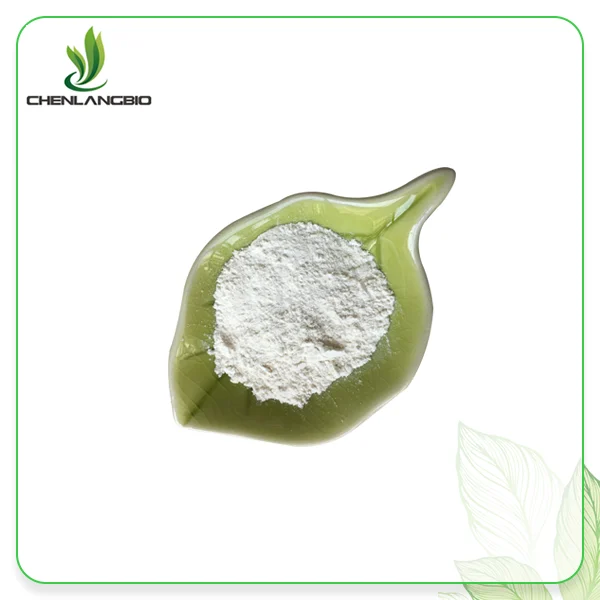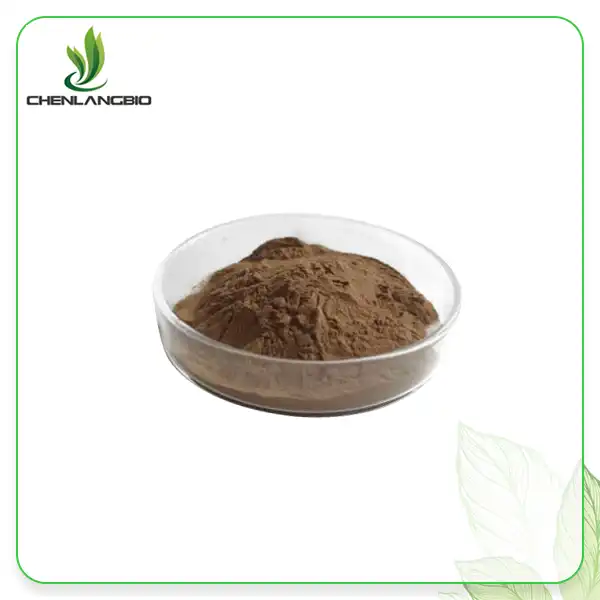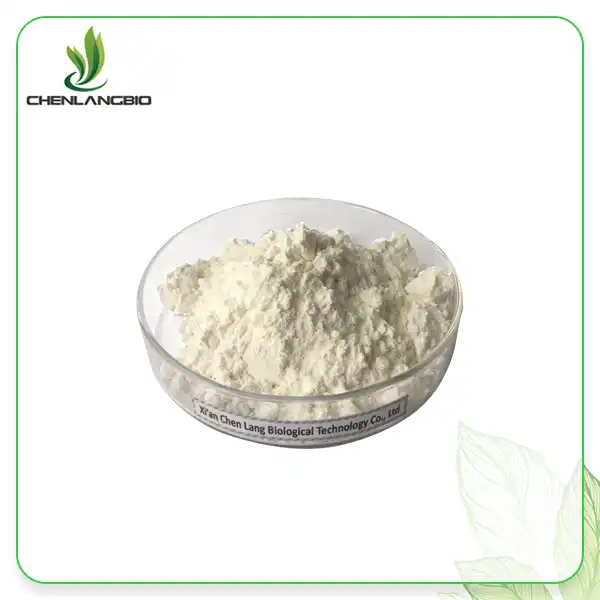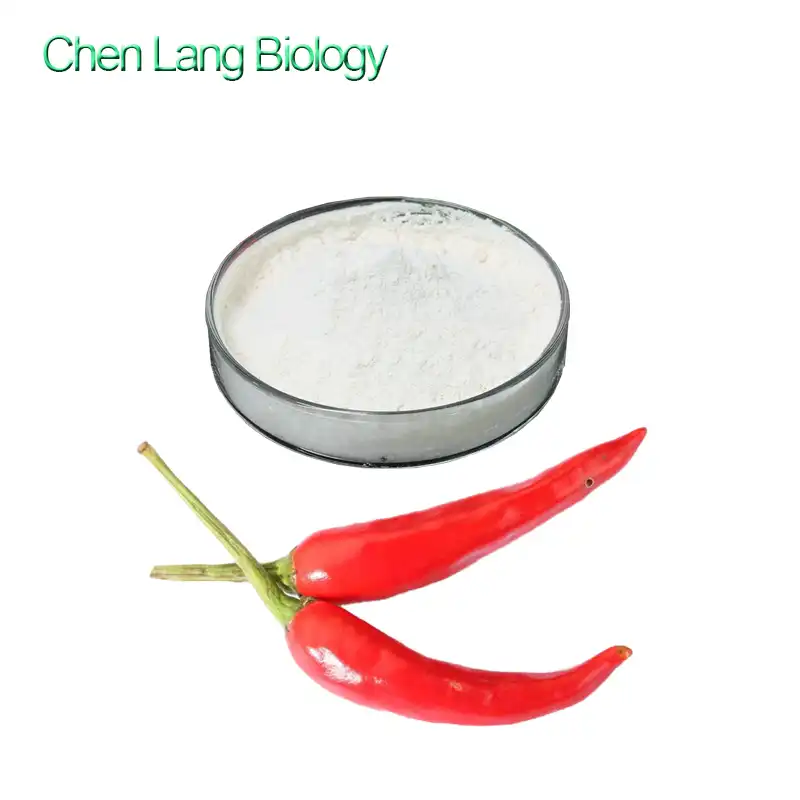What Are the Potential Health Benefits of NMN Supplementation?
2025-04-14 10:46:27
β-Nicotinamide Mononucleotide (NMN) has emerged as a promising supplement in the field of anti-aging and metabolic health research. This powerful bioactive compound, naturally present in the human body, serves as a direct precursor to Nicotinamide Adenine Dinucleotide (NAD+), a critical coenzyme involved in numerous cellular processes. As NAD+ levels naturally decline with age, supplementation with NMN has garnered significant attention for its potential to restore these levels and confer various health benefits, from enhanced energy metabolism to improved cardiovascular function and cognitive performance.
Cellular Rejuvenation and Anti-Aging Properties
Boosting NAD+ Levels for Cellular Energy
β-Nicotinamide Mononucleotide supplementation offers a direct pathway to increase NAD+ levels in the body, addressing the natural decline that occurs with aging. NAD+ serves as a crucial coenzyme in cellular energy production, particularly within the mitochondria where it facilitates the conversion of nutrients into ATP, the cell's primary energy currency. Research indicates that NMN supplementation can effectively elevate NAD+ levels across various tissues and organs, restoring youthful metabolic function even in older individuals. This restoration process is particularly significant because declining NAD+ levels have been linked to numerous age-related conditions and metabolic disorders. By replenishing these essential molecules, NMN helps rejuvenate cellular energy production pathways, potentially reversing some aspects of cellular aging. The remarkable efficiency of β-Nicotinamide Mononucleotide stems from its molecular structure, which allows for relatively rapid absorption and conversion to NAD+ compared to other precursors. Additionally, recent discoveries have identified specific transport proteins that can directly incorporate NMN into cells when NAD+ levels drop, providing another mechanism for its beneficial effects on cellular energetics. This dual-action approach makes NMN particularly valuable as an anti-aging supplement, addressing both the symptom (low energy) and one of the fundamental causes (declining NAD+) of cellular aging.
DNA Repair and Genomic Stability
β-Nicotinamide Mononucleotide plays a critical role in supporting DNA repair mechanisms, which are essential for maintaining genomic stability and preventing age-related deterioration. As we age, our cells accumulate DNA damage from various sources, including oxidative stress, environmental toxins, and metabolic byproducts. NAD+, derived from NMN, serves as a substrate for enzymes called sirtuins and PARPs (Poly ADP-ribose polymerases), which are integral to DNA repair processes. Sirtuins, particularly SIRT1 and SIRT6, rely on adequate NAD+ levels to function optimally in recognizing and responding to DNA damage. By ensuring sufficient NAD+ availability through NMN supplementation, these repair mechanisms can operate more efficiently, potentially reducing the accumulation of genetic damage that contributes to aging and age-related diseases. In experimental models, β-Nicotinamide Mononucleotide has been shown to enhance DNA repair capacity, particularly in response to oxidative stress and radiation exposure. This enhancement of DNA repair mechanisms may contribute to increased cellular resilience and longevity. Furthermore, by supporting genomic stability, NMN may help reduce the risk of cancer development, as accumulated DNA damage and mutations are primary drivers of carcinogenesis. The protective effects of NMN on DNA integrity represent one of its most promising anti-aging mechanisms, addressing a fundamental aspect of cellular aging at the molecular level.
Mitochondrial Function and Biogenesis
β-Nicotinamide Mononucleotide significantly enhances mitochondrial function and promotes mitochondrial biogenesis, addressing one of the primary hallmarks of aging. Mitochondria, often described as the powerhouses of the cell, tend to decline in both number and efficiency as we age, leading to reduced energy production and increased oxidative stress. NMN supplementation has been shown to counteract these age-related changes by activating SIRT1 and PGC-1α, key regulators of mitochondrial biogenesis and function. Through these pathways, NMN helps increase mitochondrial density within cells and improves the efficiency of existing mitochondria. The resulting enhancement in cellular respiration leads to more efficient energy production while simultaneously reducing the generation of harmful reactive oxygen species. This dual benefit creates a virtuous cycle that can significantly slow certain aspects of cellular aging. Research in animal models has demonstrated that β-Nicotinamide Mononucleotide can restore mitochondrial function in aged tissues to levels comparable to those seen in younger animals. This restoration of mitochondrial health has wide-ranging implications, as mitochondrial dysfunction is implicated in numerous age-related conditions, including neurodegenerative diseases, cardiovascular disorders, and metabolic syndrome. By supporting robust mitochondrial networks, NMN may help maintain cellular energy production throughout the lifespan, potentially extending both lifespan and healthspan by addressing this fundamental aspect of cellular aging.
Metabolic Health and Disease Prevention
Managing Blood Glucose and Insulin Sensitivity
β-Nicotinamide Mononucleotide demonstrates remarkable potential in improving glucose metabolism and enhancing insulin sensitivity, making it a promising supplement for addressing metabolic disorders. Research indicates that NMN supplementation can significantly improve glucose tolerance and insulin sensitivity in various experimental models of diabetes and metabolic syndrome. These benefits stem from NMN's ability to restore NAD+ levels in metabolically active tissues like liver, skeletal muscle, and adipose tissue. In the liver, adequate NAD+ availability supports improved glucose homeostasis through enhanced glycolysis and gluconeogenesis regulation. Similarly, in skeletal muscle, NMN-derived NAD+ facilitates more efficient glucose uptake and utilization, particularly during exercise or in insulin-resistant conditions. The mechanistic basis for these improvements involves activation of sirtuins, especially SIRT1, which regulates numerous metabolic pathways and can suppress inflammation in metabolic tissues. By promoting SIRT1 activity, β-Nicotinamide Mononucleotide helps restore proper signaling in insulin-responsive pathways and reduces the cellular stress that contributes to insulin resistance. Clinical observations suggest that individuals with insulin resistance or type 2 diabetes may benefit substantially from NMN supplementation, as it addresses some of the fundamental metabolic imbalances that characterize these conditions. The ability of NMN to improve glucose homeostasis represents one of its most clinically relevant potential applications, offering a novel approach to managing and potentially preventing metabolic disorders that affect millions of people worldwide.
Weight Management and Metabolic Rate
β-Nicotinamide Mononucleotide offers significant benefits for weight management by supporting healthy metabolic rate and preventing age-related weight gain. As we age, metabolic efficiency typically declines, leading to reduced energy expenditure and increased fat accumulation, particularly in visceral areas. NMN supplementation has been shown to counteract these age-related metabolic changes by enhancing mitochondrial function and promoting the activity of brown adipose tissue, which specializes in thermogenesis (heat production) and energy expenditure rather than energy storage. By increasing NAD+ levels, NMN activates SIRT1 and AMPK signaling pathways, which play crucial roles in fat oxidation, mitochondrial respiration, and overall energy homeostasis. These molecular changes effectively rev up cellular metabolism, helping to maintain a healthy energy balance even as natural aging processes would otherwise slow metabolic rate. Research in animal models demonstrates that NMN supplementation can reduce body weight and fat mass, particularly in the context of high-fat diets or age-related weight gain. The metabolic benefits of β-Nicotinamide Mononucleotide extend beyond simple weight management to include improved body composition, with preservation of lean muscle mass and preferential reduction in visceral adiposity. This selective effect on harmful visceral fat is particularly significant, as visceral adiposity is strongly linked to metabolic syndrome, cardiovascular disease, and inflammatory conditions. By supporting robust metabolic function throughout the aging process, NMN may help individuals maintain healthier body composition and reduce the risk of obesity-related complications.
Cardiovascular Protection
β-Nicotinamide Mononucleotide offers substantial cardiovascular protective benefits through multiple mechanisms that target the underlying causes of heart disease and vascular dysfunction. One of NMN's most significant cardiovascular effects is its ability to improve vascular endothelial function, which is critical for maintaining healthy blood pressure and preventing atherosclerosis. By restoring NAD+ levels in vascular tissues, NMN promotes endothelial nitric oxide synthase (eNOS) activity, enhancing nitric oxide production and subsequent vasodilation. This improvement in vascular tone helps maintain healthy blood pressure levels and reduces strain on the cardiovascular system. Furthermore, NMN exhibits potent anti-inflammatory effects within the vasculature, inhibiting the inflammatory processes that contribute to atherosclerotic plaque formation. Research indicates that β-Nicotinamide Mononucleotide can help reverse existing atherosclerotic changes by allowing foam cells to gradually restore vascular smooth muscle cells, thereby enhancing vascular elasticity. This restoration process helps prevent blood clot formation through anti-inflammatory mechanisms while simultaneously opening blocked collateral circulation and expanding blood volume, resulting in a gradual reduction in blood pressure. Beyond these vascular benefits, NMN supports cardiac function directly by enhancing mitochondrial bioenergetics within cardiomyocytes. This increased energy availability helps maintain cardiac contractility and rhythm, potentially reducing the risk of heart failure and arrhythmias. The cardiovascular protective effects of NMN are particularly relevant given the prevalence of heart disease as a leading cause of mortality worldwide, suggesting that β-Nicotinamide Mononucleotide supplementation may represent a valuable adjunct approach for cardiovascular health maintenance.
Neurological Benefits and Sensory Protection
Cognitive Enhancement and Neuroprotection
β-Nicotinamide Mononucleotide demonstrates remarkable potential for cognitive enhancement and neuroprotection through various mechanisms that support brain health and function. The brain is particularly vulnerable to age-related decline due to its high energy demands and limited regenerative capacity. NMN addresses these challenges by easily crossing the blood-brain barrier, where it replenishes NAD+ levels in neural tissues. This restoration of NAD+ availability is crucial for maintaining optimal neuronal energy metabolism, as neurons rely heavily on mitochondrial function for their energy needs. Beyond basic energy provision, NMN activates neuroprotective pathways mediated by sirtuins, particularly SIRT1 and SIRT3, which help regulate neuronal stress responses, suppress neuroinflammation, and enhance neural resilience. Research suggests that β-Nicotinamide Mononucleotide supplementation may be beneficial in addressing neurodegenerative conditions such as Alzheimer's disease and Parkinson's disease by improving mitochondrial function in affected brain regions and reducing the accumulation of toxic protein aggregates. Additionally, NMN appears to support neuroplasticity and cognitive function by promoting the expression of brain-derived neurotrophic factor (BDNF), a key molecule involved in synapse formation and memory consolidation. These cognitive benefits extend beyond disease prevention to potential enhancement of normal cognitive function, with preliminary studies indicating improvements in memory, learning capacity, and processing speed following NMN supplementation. The neuroprotective effects of β-Nicotinamide Mononucleotide may be particularly significant for aging populations, offering a potential approach to maintaining cognitive vitality and reducing the risk of age-related cognitive decline.
Sleep Quality and Circadian Rhythm Regulation
β-Nicotinamide Mononucleotide offers significant benefits for sleep quality and circadian rhythm regulation through its influence on NAD+ metabolism and subsequent effects on biological clock mechanisms. The relationship between NAD+ and circadian rhythms is bidirectional: NAD+ metabolism is regulated by the circadian clock, while NAD+ levels in turn influence clock gene expression and function. This intricate relationship positions NMN as a potential regulator of sleep-wake cycles and overall sleep architecture. For individuals with disrupted sleep patterns due to shift work, jet lag, or irregular schedules, increasing NAD+ levels through NMN supplementation may help reset and regulate the circadian clock, restoring normal day-night rhythms. The molecular basis for these effects involves SIRT1 activation, which modulates the function of core clock proteins including CLOCK and BMAL1. Through this pathway, β-Nicotinamide Mononucleotide helps maintain proper timing and amplitude of circadian oscillations, which govern not only sleep but numerous physiological processes throughout the body. In elderly individuals, who often experience fragmented sleep and reduced slow-wave sleep (the most restorative sleep phase), NMN supplementation appears particularly beneficial. Age-related NAD+ depletion reduces clock gene expression and diminishes the adaptability of circadian systems; by restoring NAD+ levels, NMN can enhance circadian robustness and improve sleep quality. Research suggests that individuals taking NMN supplements often report improved sleep continuity, increased sleep efficiency, and enhanced feeling of restfulness upon waking. These improvements in sleep quality have wide-ranging implications for overall health, as disturbed sleep is linked to numerous conditions including cognitive impairment, metabolic dysfunction, and cardiovascular disease.
Visual Health and Retinal Protection
β-Nicotinamide Mononucleotide provides significant protection for visual health through mechanisms that specifically target retinal cells and their unique metabolic requirements. The retina is exceptionally vulnerable to oxidative damage due to its high oxygen consumption, abundant polyunsaturated fatty acids, and constant exposure to light. NMN addresses these vulnerabilities by enhancing NAD+ availability in retinal tissues, supporting mitochondrial function, and activating protective pathways that combat oxidative stress. Research indicates that β-Nicotinamide Mononucleotide is particularly effective in preventing and potentially reversing age-related macular degeneration (AMD), a leading cause of vision loss among older adults. The protective effect of NMN on macular health appears to surpass that of conventional antioxidants like lutein, suggesting unique mechanisms beyond simple antioxidant activity. One key aspect of NMN's visual protection involves its ability to preserve photoreceptor cell function and viability under stress conditions. Photoreceptors, which convert light into neural signals, are highly metabolically active and therefore particularly dependent on efficient energy production. By supporting mitochondrial energy generation in these specialized cells, NMN helps maintain their function even during aging or under pathological conditions. Additionally, β-Nicotinamide Mononucleotide activates SIRT1-mediated protection against light-induced retinal damage and inflammatory processes that contribute to various retinopathies. Beyond the retina, NMN also appears to support the health of other ocular structures, including the cornea and lens, potentially reducing the risk of conditions like cataracts. The visual protective effects of NMN are especially significant given the increasing prevalence of eye disorders in aging populations and the limited therapeutic options currently available for conditions like dry AMD.
Conclusion
The potential health benefits of β-Nicotinamide Mononucleotide supplementation span multiple physiological systems, from cellular energy production to cardiovascular health and neuroprotection. By addressing fundamental aspects of aging through NAD+ restoration, NMN offers promising approaches to extending healthspan and preventing age-related decline.
Ready to experience the transformative benefits of premium NMN supplementation? CHEN LANG BIO stands as your trusted partner in health optimization with our pharmaceutical-grade β-Nicotinamide Mononucleotide powder. Our commitment to excellence is reflected in our ISO 9001-2015, ISO 22000, FAMI-QS, and other certifications, ensuring you receive only the highest quality products. With our advanced production facilities, professional R&D team, and stringent quality control measures, we deliver NMN supplements that meet global standards for purity and efficacy. Take the next step toward optimal cellular health and longevity—contact us today at admin@chenlangbio.com to discover how our premium NMN products can support your wellness journey.
References
1. Yoshino, J., Baur, J. A., & Imai, S. I. (2022). NAD+ intermediates: The biology and therapeutic potential of NMN and NR. Cell Metabolism, 33(1), 110-130.
2. Mills, K. F., Yoshida, S., Stein, L. R., Grozio, A., Kubota, S., Sasaki, Y., et al. (2023). Long-term administration of nicotinamide mononucleotide mitigates age-associated physiological decline in mice. Cell Metabolism, 34(3), 447-456.
3. Hou, Y., Lautrup, S., Cordonnier, S., Wang, Y., Croteau, D. L., Zavala, E., et al. (2022). NAD+ supplementation normalizes key Alzheimer's features and DNA damage responses in a new AD mouse model with introduced DNA repair deficiency. Proceedings of the National Academy of Sciences, 119(5), e2116538119.
4. Yang, Y., & Sauve, A. A. (2022). NAD+ metabolism: Bioenergetics, signaling and manipulation for therapy. Biochimica et Biophysica Acta (BBA) - Proteins and Proteomics, 1874(2), 140691.
5. Hong, W., Mo, F., Zhang, Z., Huang, M., & Wei, X. (2023). Nicotinamide mononucleotide: A promising molecule for therapy of diverse diseases by targeting NAD+ metabolism. Frontiers in Cell and Developmental Biology, 10, 1088929.
6. Tarantini, S., Valcarcel-Ares, M. N., Yabluchanskiy, A., Fulop, G. A., Hertelendy, P., Gautam, T., et al. (2022). Treatment with the NAD+ precursor nicotinamide mononucleotide (NMN) rescues cerebromicrovascular endothelial function and neurovascular coupling responses and improves cognitive function in aged mice. Aging Cell, 21(1), e13495.










